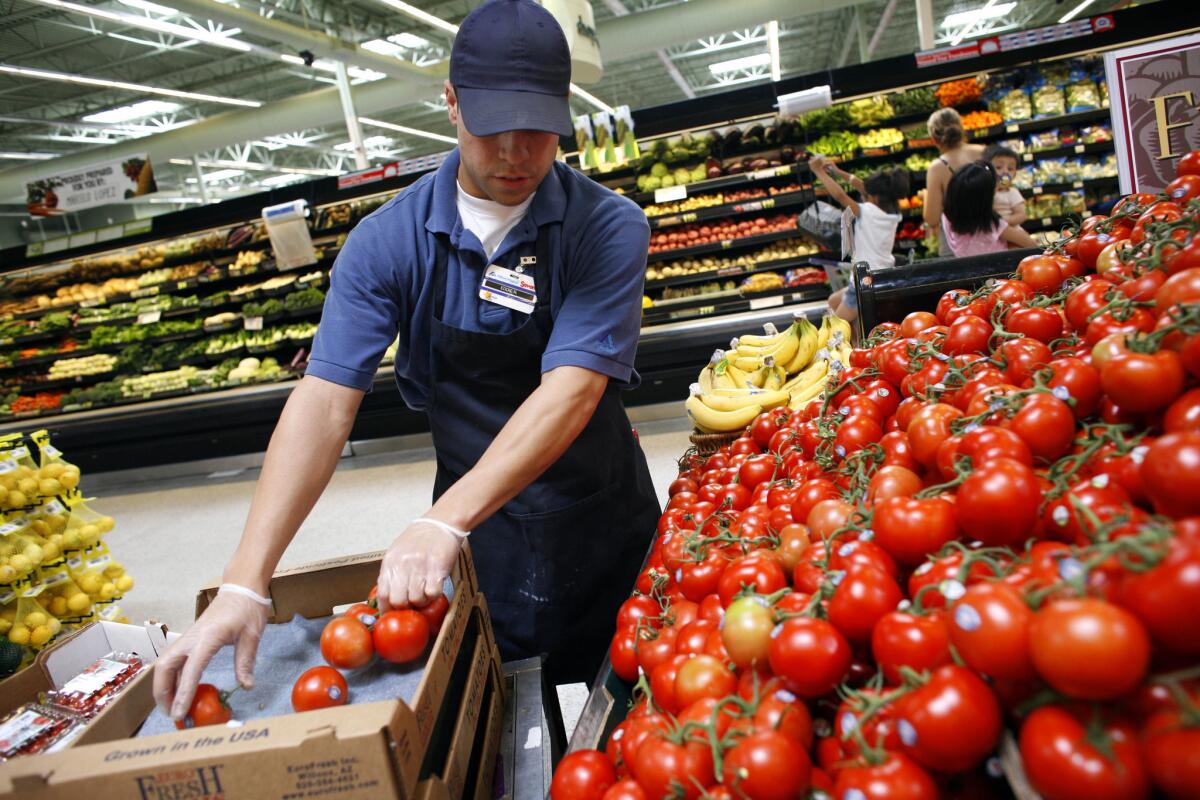Access to a supermarket improves eating habits, study says, but not for the reason you’d think

A RAND study has found that opening a grocery store in a “food desert” -- an area devoid of healthy eating options -- lowered residents’ daily total calorie intake as well as their consumption of added sugars, solid fats and alcoholic beverages.
- Share via
People without easy access to a supermarket eat healthier after one opens in their neighborhood, but not because they shop at the new store, new research finds.
A study published Monday in the journal Health Affairs found that opening a grocery store in a “food desert” -- an area devoid of healthy eating options -- lowered residents’ daily total calorie intake as well as their consumption of added sugars, solid fats and alcoholic beverages.
“We found multiple positive changes following the opening of the supermarket in a former food desert,” lead author Tamara Dubowitz, a senior policy researcher at nonprofit research organization RAND Corp., said in a statement. “Yet the changes in diet were not related to use of the supermarket.”
Evaluating a neighborhood in Pittsburgh, Dubowitz and her colleagues found that the improvements in eating habits were not associated with whether people shopped at the store. The researchers speculated that the local advocacy efforts that led to the store’s arrival, and marketing campaigns around its opening, caused the dietary improvements in the neighborhood, not use of the store itself.
“This supports federal efforts to help open grocery stores in foods deserts, but also provides a very strong case for continued evaluation of this policy to understand exactly what the mechanisms might be,” Dubowitz said. The federal government has spent hundreds of thousands of dollars in recent years to increase the number of places selling fresh food in underserved neighborhoods.
The RAND finding adds to a growing body of research showing that the solution to the obesity epidemic is not as simple as dropping supermarkets in food deserts, and instead requires a variety of changes, including to cultural preferences and advertising. Other studies by RAND researchers have found that the food environment in Los Angeles plays little role in what people eat.
The new study compared data from households in two predominantly African American neighborhoods in Pittsburgh -- Hill District and Homewood -- that had been lacking a supermarket. In 2013, a grocery store opened in the Hill neighborhood.
The results were unexpected. The researchers found that between 2011 and 2014, consumption of fruit and vegetables and whole grains declined in both neighborhoods, with the supermarket appearing to have little effect. They also found no significant change in rates of obesity or being overweight in Hill.
They did find a drop in daily calorie intake and added sugars in the Hill neighborhood, but it wasn’t linked to whether people shopped at the grocery store. Residents of Hill also reported better access to healthy foods such as low-fat products and fruits and vegetables, as well as improved satisfaction with their neighborhood as a place to live.
The positive effects, researchers wrote, were perhaps due to the public discussions preceding the supermarket’s opening that brought to light the need for fresh food in the neighborhood. This explanation underscores a conclusion found in much recent research: the importance of education and personal choice when it comes to eating habits.
“The new supermarket may have also stimulated economic development in the neighborhood and instilled hope among community residents who were heartened by public and private investment in their neighborhood and their health,” the researchers wrote.
Follow @skarlamangla on Twitter for more health news.
ALSO
Sierra Nevada could get up to a foot of snow as storm moves in
How much does severe obesity cost California? About $9.1 billion
Man shot in the face as he and his family drive through Garden Grove
More to Read
Sign up for Essential California
The most important California stories and recommendations in your inbox every morning.
You may occasionally receive promotional content from the Los Angeles Times.











